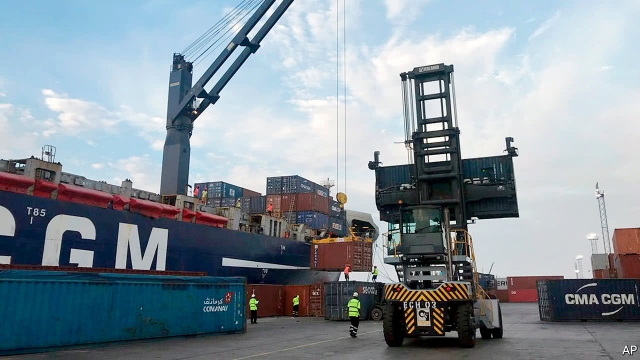THE ancient port town of Berbera in Somaliland, a breakaway state in northern Somalia, is generally a sleepy place. The heat, which can reach 50 degrees Celsius in the summer, stifles even the dogs. Yet visitors will find it buzzing at the moment. Near the edge of town, sand and rubble fill the space where, until recently, there were 19th-century Ottoman traders’ houses. New buildings are springing up. A little out to sea, as half a dozen ships idle in the sun, a barge from Dubai hauls a colossal crane towards the shore.
All of this activity relates to a new port being built by DP World, a company mostly owned by the government of Dubai, part of the United Arab Emirates (UAE). At the moment, Berbera’s port is small—used mostly for the export of livestock to the Persian Gulf, and the import of goods to Hargeisa, the capital of Somaliland. However, over the next decade or so, thanks to DP World, it could turn into one of east Africa’s biggest. The port and another Emirati project, to build a military base in Berbera, are powerful reminders of how money from the Gulf is changing the Horn of Africa. It also risks exacerbating the struggle between Somalia’s weak, but internationally recognised federal government in Mogadishu and its restive, secessionist regions.
The Berbera port, which will cost some $450m, is by far the biggest investment in Somaliland since the province declared independence from Somalia in 1991 (in practical, but not legal, terms it is a separate country). It has taken on a new significance since February, when DP World was thrown out of neighbouring Djibouti, where it had operated the main port since 2009. Djibouti currently handles over 90% of Ethiopia’s sea trade, and also hosts French, American and Chinese naval bases. Somaliland officials probably hope to steal some of that traffic. In March Ethiopia announced it had bought a 19% stake in the Berbera port.
The project annoys politicians in Mogadishu, who fear losing more of their already meagre authority. So they have kicked back at the UAE. Last month parliament passed a law banning DP World from all of Somalia (something it cannot enforce). On April 8th the authorities in Mogadishu temporarily seized an Emirati plane carrying some $9.6m in cash, apparently intended for soldiers in Puntland, another autonomous state, being trained by the UAE. On April 11th the defence minister announced that Somalia would end a similar programme in which the UAE paid and trained soldiers in the national army, who will henceforth be paid by the (penniless) federal government.

Officials in Somaliland are unruffled. The federal government “cannot control even ten square kilometres of Mogadishu”, says Liban Yusuf Osman, Somaliland’s deputy foreign minister, dismissing its objection to the port deal. But the dispute drives a big wedge between the two governments, says Rashid Abdi of International Crisis Group, a Brussels-based NGO. It does not help that many politicians in Mogadishu are thought to have taken money from Qatar, the UAE’s rival, or that Turkey, another rival, is one of Somalia’s biggest foreign investors.
Indeed, the government in Mogadishu is a mess, thanks in part to constant manoeuvring by foreign-funded politicians. On April 9th the speaker of parliament, Mohamed Osman Jawari, stood down, having apparently lost a power struggle with the prime minister, Hassan Ali Khayre, and the president, Mohamed Abdullahi Mohamed, known by his nickname “Farmaajo”.
A few days before, African Union soldiers had to step in after Mr Jawari’s bodyguards stormed the parliament and ran up against troops loyal to the prime minister. Both sides ostensibly oppose the port in Berbera, but Mr Jawari saw an opportunity to seize more power for parliament by holding a (symbolic) vote on the deal, without consulting Mr Mohamed.
The bickering does not help the cause of a unified Somalia. The government in Mogadishu has little to offer the country’s regions. That allows countries like the UAE to swoop in and fill the gaps. Al-Shabab, a terrorist group linked to al-Qaeda, continues to mount successful attacks. On April 1st dozens of Ugandan soldiers were killed by the jihadists in the most deadly raid in over a year. The greater the chaos in the areas ostensibly controlled by federal government, the smaller the incentive for regions such as Somaliland to care what its politicians think.
































